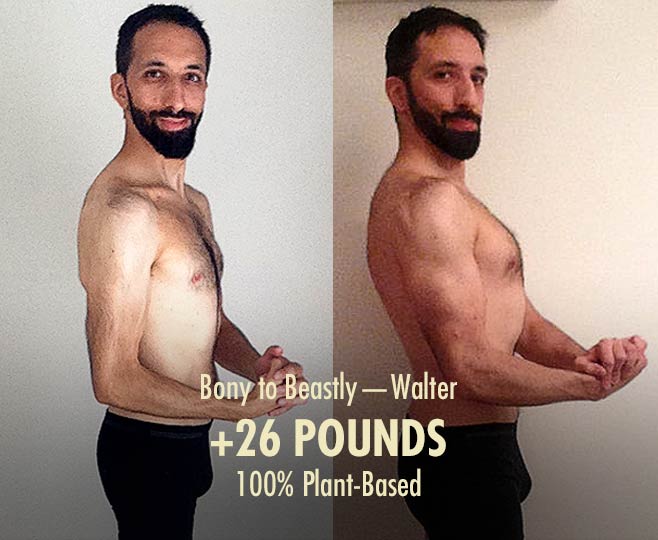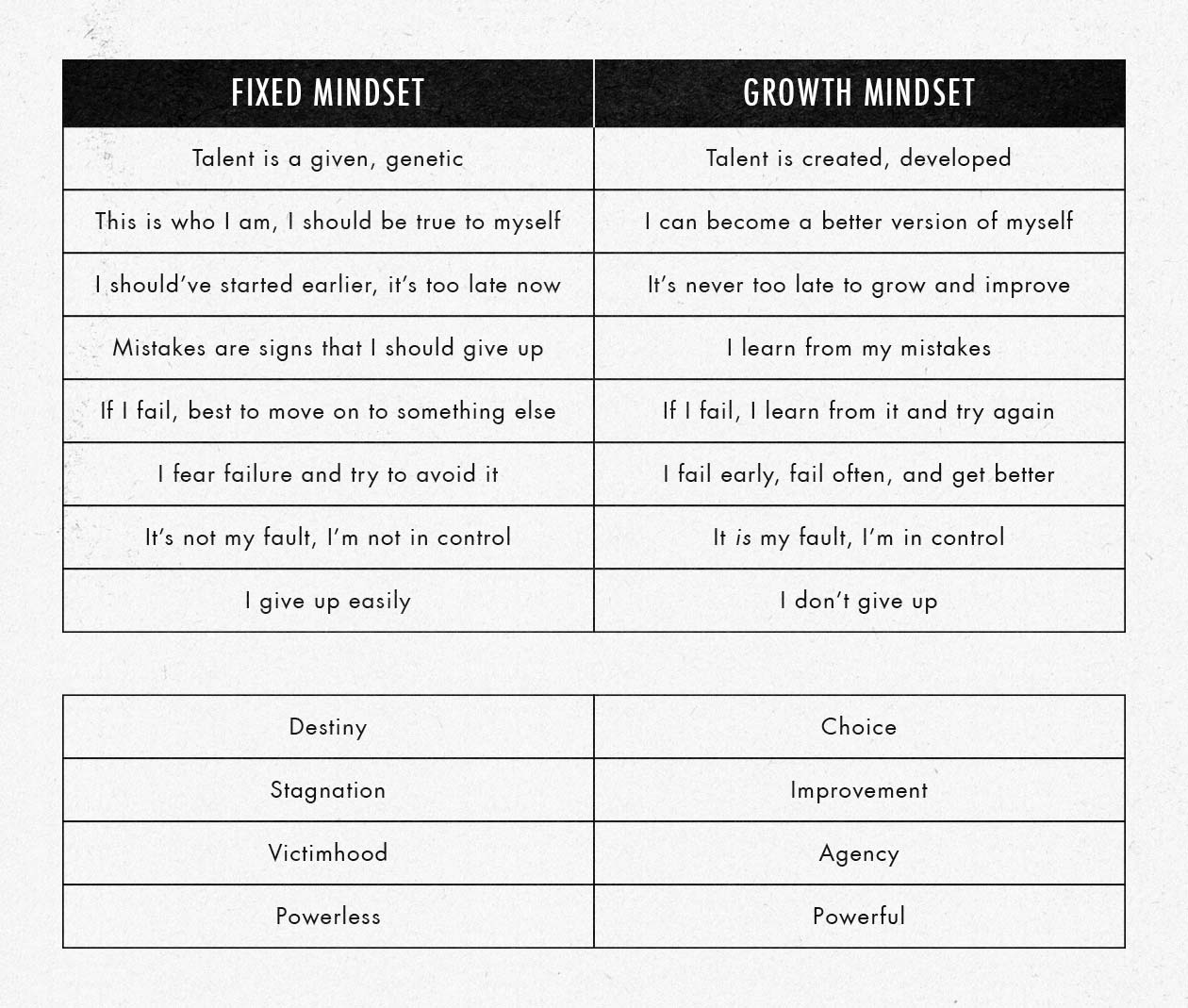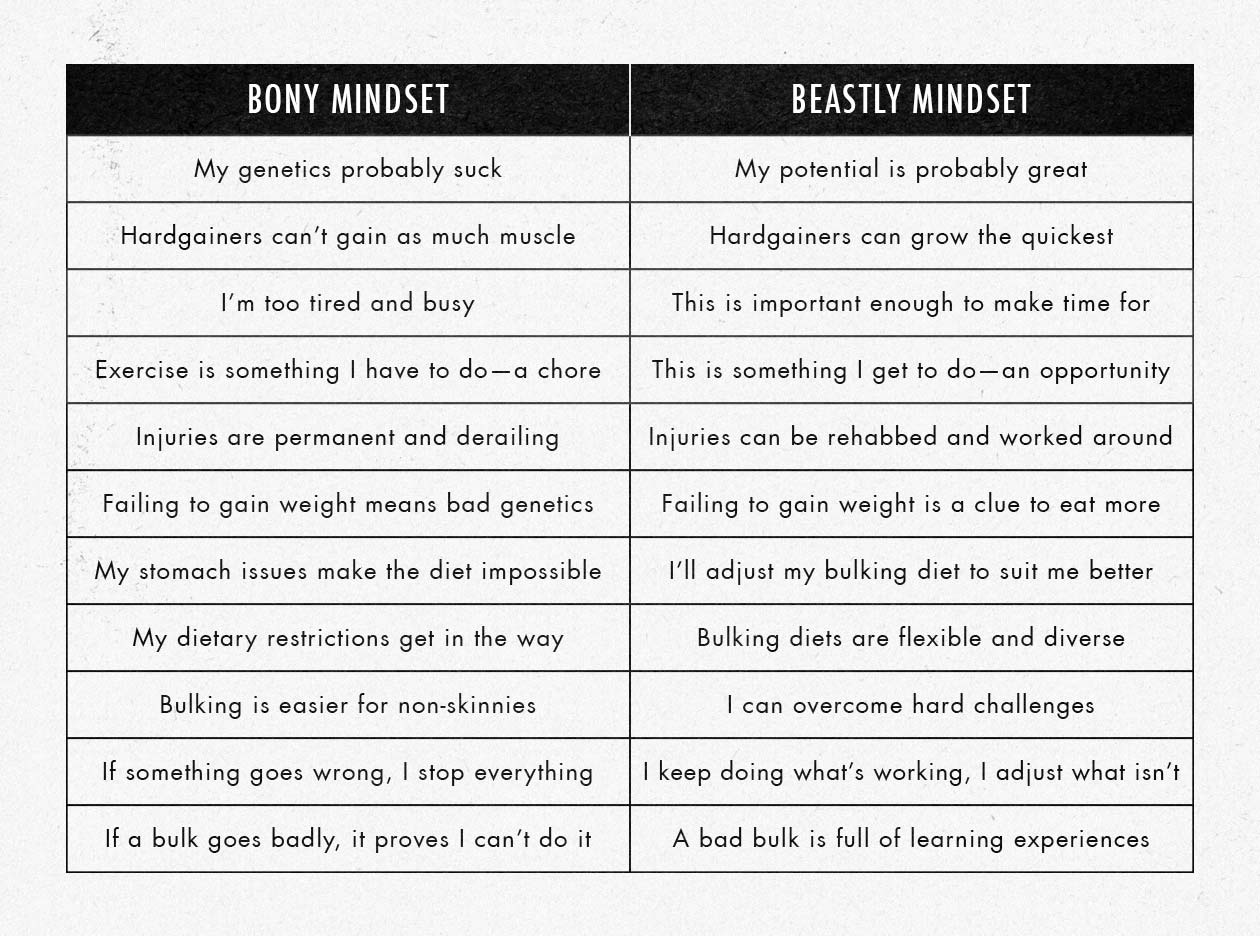
The Growth Mindset
One of the biggest obstacles to transform our bodies might not be in our genes. It’s not about being skinny. It’s not about being ectomorphs. Many times, what holds us back are our beliefs. We want to change our bodies, but… how can we get started on a new journey when—deep inside—we believe we won’t make it?
We say we want to gain weight and put on muscle, but part of us holds back. Otherwise, we should have already solved this, right? If you are still struggling with being skinny, chances are you need to take a look at your mindset.
In fact, if you can adopt the right mindset, it won’t just change your psychology, it will also change your physiology. It will improve the rate that you build muscle through a process akin to the placebo effect, where simply believing that you can grow will physically increase the rate that you’re able to gain muscle.
Foreword by Shane
When Walter suggested writing this article, it made me think of a 1972 study purportedly about steroids. It’s a famous old study that a few great bloggers have already written about, including both Greg Nuckols at Stronger by Science, and James Clear, author of Atomic Habits.
So, the first thing to know about this study was that none of the participants were actually given steroids. The researchers lied to the participants, telling some of them that they were being put on a steroid protocol (10mg/day of Dianabol).
In truth, the study was about whether a simple shift in mindset could alter someone’s progress in the gym. The people who were given the fake steroid pills would believe that they had a greater potential to build muscle. Would that extra confidence translate into better progress?
If you’re familiar with the placebo effect, you’d expect a small benefit from the fake steroids. What happened, though, was shocking. The people who mistakenly believed they were on steroids improved their squat strength almost 14x as quickly!
To quote James Clear, “The evidence was clear. Every athlete got stronger simply because they believed they were on steroids. They expected to improve and so they did.”
These results were then replicated in a 2000 study conducted on powerlifters competing at the national level. With these elite lifters who are already pushing up against their genetic potential, who already know their true limits in the gym, you might expect a mindset shift to have no effect on how much strength they gained. But again, the participants who thought they were on steroids were able to add 4–5% (likely 50–100 pounds) more weight to their powerlifting total over the course of their training program—which is a greater increase in strength than steroids themselves could have produced!
In this second study, the researchers also added a second phase: they informed the participants that they were just taking placebo pills, the participants went back to training, and then their strength was measured again. At their next strength test, their performance had regressed back to their “pre-steroid” levels. The gains disappeared along with the shift in mindset.
The point here is that a shift in mindset could help you remove the fake bottleneck that’s preventing you from growing. And to get this benefit, we don’t even need to lie to you. If we look at how much muscle a skinny hardgainer can expect to gain in his first year, we’re talking about around 40 pounds, as we covered in our article about how quickly hardgainers can gain size and strength… which just so happens to be more than the average lifter could expect to gain while on steroids. If you start having faith in yourself, and in your genetics, you really can make steroid-like gains.
More importantly than that, though, having the right mindset will help you stick to the plan, overcome setbacks, and absolutely guarantee consistent progress, which is even more valuable than gaining at a slightly pace. Mind you, to get all of those benefits, you have to do more than just believe in yourself. There’s a whole method to it.
So, without further ado, here’s Walter:
How I used the Growth Mindset to Bulk Up
I struggled with being skinny since my teenage years. No matter how much I ate, I couldn’t gain weight. That’s why—at 15 years old—I decided to join a gym. During the next decade, I would be able to put on a couple pounds and gain some strength, but I basically remained skinny for the rest of my twenties. When I was 24 years old, I decided to go vegan. Soon after that, I lost between six and eight pounds. Now the struggle was real. If I couldn’t put on muscle before, how was I supposed to do it now, while eating a 100% plant-based diet? Would that even be possible?
In 2016 I learned about Bony to Beastly. I just loved the articles, the design, and the kindness of these guys. I immediately subscribed to the newsletter, but I didn’t feel ready to tackle the challenge yet. I really wanted to change my body and to improve my lifestyle overall. It’s just that my mindset wasn’t aligned with my goal. I didn’t think this was possible for me. But I kept it in my mind, and eventually, I summoned the courage.
In April 2018 —at 31 years old— I finally put my hands on the b2B program. I worked hard at it and got great results. Even though their recommended diet is not entirely plant-based, they made it clear there were options for those who wanted to keep it vegetarian or even vegan. I adapted the essential ideas and learned the rest from other resources (YouTube is your friend!). The ebook, the videos, the workout programs, the coaching, and the friendly support in the forums were just great.
In case you’re still wondering: yes, it is possible to bulk up on a 100% plant-based diet. I have done this. Many people have done this in the past, many are doing it right now, and many more will do it in the future. If you’re vegan or vegetarian, you can be the next one, regardless of being skinny.
I’m sure you have your own unique struggle, too, whatever it. Your own list of reasons why building muscle will be hard—or even impossible—for you.
You didn’t choose to be skinny. You didn’t choose to instantly burn every calorie you eat. It’s just the body you got. Maybe you can’t change your genetics nor your metabolism. It’s not like we can just wish our skinniness away.
However, your genetics aren’t a real limitation. Even the hardest hardgainer has the potential to build a truly impressive physique. At most, your genetics will hold you back by one standard deviation in strength, which amounts to about 5–10% less muscle mass. That will still allow you to become far more muscular than most Hollywood action heroes, let alone the average lifter, before running up against your genetic potential.
We can change our bodies, but it takes time, effort, and work (and sometimes a lot of work). The very first step could be to adopt the right mindset to make the change possible — a growth mindset. Adopting a growth mindset opens up the rest. When you know you can change, you gain confidence. And when you’re confident, growing becomes easier (literally!).
In Mindset: The New Psychology of Success, Carol Dweck defined the growth mindset as follows:
“[The] growth mindset is based on the belief that your basic qualities are things you can cultivate through your efforts. Although people may differ in every which way —in their initial talents and aptitudes, interests, or temperaments— everyone can change and grow through application and experience”
Your Attitude and Muscle Gains
There’s the growth mindset, and there’s also the fixed mindset—its counterpart. The growth mindset hinges on our ability to learn and adapt. The fixed mindset hinges on our genetic gifts and natural talents—that you either have it or you don’t. It leaves no room for growth. We become stuck.
Even though this applies to many fields and areas of life, in this article we will focus on the consequences of adopting these mindsets regarding building muscle and physical growth.
Imagine two skinny guys. The first one has a growth mindset, the second has a fixed mindset. How does this play out in when they try to bulk up?
The first guy believes that skinny guys are able to build just as much muscle as any other body-type (with the right training, rest, and nutrition, of course). The second guy thinks that for naturally skinny “hardgainers”, building muscle will be almost impossible.
The first guy is is very enthusiastic about the challenges he will face throughout the process, ready to learn from his mistakes. He sees temporary failures as feedback that will allow him to improve his bulking plan, ultimately bringing him closer to his goals. For example, if eating 2500 calories per day isn’t enough to gain weight during his first week of bulking up, he’ll try eating 2750 calories per day during the next week. Every setback improves his plan.
The second guy feels defeated even before starting. He comes up with plenty of excuses and finds a way to explain why he will never be able to overcome the challenges of building muscle as a skinny guy. If eating 2500 calories per day isn’t enough for him to gain weight, he’ll blame his fast metabolism, he’ll blame the calorie algorithms, and he’ll use it as an excuse to give up. This failure just confirms what he knew all along: building muscle is impossible for him.
The same challenge. The same body type. But two different attitudes. Two different mindsets.
One guy’s mindset makes growth inevitable, no matter how many problems he runs into. The other guy’s mindset means that even a single setback or error will keep him fixed in place forever.
Time to Grow
Many skinny guys use age as an excuse to avoid getting bigger. People in their 30’s, 40’s, or 50’s say that it’s already too late to start training and to bulk up. “I should have started in my 20s”, “I should have started in my teenage years.” The perfect argument to put off our body transformation—forever!
Yes, you should have started yesterday. But that will still be true tomorrow, which is why you should start today.
If you think that it gets harder to build muscle as you get older, the logical thing to do is start building muscle as young as you can—now. After all, the longer you put this off, the harder it will become.
That assumption isn’t entirely true, though. A 2005 study by Hubal studied men between the ages of 18 and 40 and found no differences in their ability to gain muscle mass (study). The researchers speculated that difficulties in building muscle mass wouldn’t occur until past the age of sixty.
This lines up perfectly with the research into strength gains. Greg Nuckols, MA, from Stronger by Science found that the ability to gain strength doesn’t start to diminish until guys reach eighty years old!
If that’s the case—and it is—then, how wouldn’t you be able to grow beastlier in our 20’s, 30’s or 40’s? When you check the facts, that stops being an excuse. You need to face the harsh reality: you can do this. This is physically possible for you.
There’s no need to create imaginary obstacles and to make it seem impossible. It is not.
Besides, even real obstacles can be overcome.
Grow, Recalibrate, and Keep Growing
We see people setting goals, going after them, and conquering in a couple months. Many skinny guys start training and reach their weight goals in two or three months. Maybe you’ll be one of them. Or maybe not.
Most naturally skinny guys can gain around a pound per week, but some guys can gain as much as two pounds per week, and others—especially skinny-fat guys—will often need to gain at a slower pace, aiming to gain “just” half a pound per week (which is still over 25 pounds in just a year!).
That assumes that you’re able to gain at a steady pace, though. That might not be the case. You might get a stomach flu, you might need to take breaks or vacations, or you might spend a few weeks failing to gain weight, requiring that you adjust your calorie intake until you’re gaining at the right pace. Delays happen.
Truth is, you don’t know exactly how much time this will take. Are you willing to put in the time and effort even if this takes six months, a year, or more?
Having a growth mindset will help, but your determination will also depend on your why’s. Why do you want to grow beastlier? Why will this improve your life? Why is this worth doing? Once you have honest answers for these questions, you’ll be ready to commit to your goal from a deeper place.
Having clarity on our bulking purpose is especially important when things are not going right. You can be sure that there will be setbacks on the journey. Try to avoid as many as you can, but sooner or later something is bound to happen.
When something inevitably goes wrong, it’s not about getting angry or frustrated. Everyone makes mistakes and will have to deal with the setbacks. Sometimes the setback isn’t even in our control to begin with. It’s a question of how quickly can we get back on track. Keeping our goal in mind —and remembering why this is important to us— can make a big difference.
If you get a cold, yes, that could prevent you from building muscle for a week. But so long as you get back on track afterwards, that week of being sick won’t matter a year from now.
Skill-Building for Skinny Guys
Growing a beastly body is not all about the physical part. There’s also the mind. When we are open and curious about the path ahead of us, that’s when we learn the most. And that’s the reason why we need to embrace curiosity. You see, getting to build a bigger body requires a great deal of effort. You need to become curious about nutrition, training, rest, and how to juggle all the balls in your current lifestyle. That’s the first step to cultivating all those skills. Which is connected with the process of skill building.
If you’re skinny, chances are you need to level-up a few skills. If you haven’t ever lifted weights, you will need to learn how to lift. This involves learning proper technique, how to pace yourself, and how to gradually increase the weights (among other things). Learning how to lift is important, but there are other skills you’ll need to develop as well, such as cooking skills and learning the basics of nutrition.
Unless you’re buying prepared meals, eating out every day—or if you’re lucky enough to have someone else to cook for you!—you will have to cook your own meals. This is tied up with the second skill: learning about nutrition. If you want to bulk up you cannot just haphazardly eat a lot of everything and hope for the best. (In the bulking world, that approach is called eating a “see-food diet,” where you eat everything you see.)
To bulk up leanly, effectively, and healthfully, you need to learn about the different macronutrients (fats, carbohydrates and protein) and how to make good choices on what you eat. And, on top of that, you better make it tasty and enjoyable!
But don’t worry if you know nothing about nutrition or if you have zero cooking skills. You can learn. Having a goal like putting on muscle mass can be enough motivation to tackle these additional skills. And the good thing is that once you develop these skills, you’ll have them for life. They won’t just help you build muscle, they’ll also improve your life in virtually every way, from your general health, to the enjoyment that you get from food, to the joy that you can give to others through your cooking.
Finally, another important aspect in the skill-building process is connected to self-discipline. In order to make this work you’ll need to stick to the plan and take action consistently.
Most beginner to intermediate lifters will get the best results if they lift weights three times per week, focus on getting stronger at the main compound movements, eat sufficient calories and protein to stimulate muscle growth, get most of those calories from whole foods, and sleep at least 7.5 hours every day. Depending on where you’re starting at, this might be more or less difficult. It doesn’t matter.
You’re starting where you’re starting. You can’t change that. But you can always improve and grow. And as you do, you’ll develop more willpower and self-discipline, too. That’s going to make it easier to keep growing and improving. This is how the growth mindset builds upon itself.
Challenge Yourself to Grow
If you’re reading this, it’s probably because you want to grow a bigger body. That’s great! And that’s also how I got started on this journey. But bear in mind there’s more than that. You can frame this as a challenge to grow as a human being. To become a better person overall. Embracing a growth mindset helped me achieve my fitness goals, but it also transformed my entire life. And it can transform yours as well.
Walter Freiberg is a writer, translator, entrepreneur, and piano teacher. He helps people develop skills such as languages, music, and arts. You can find more of Walter's content at: www.walterfreiberg.com.



